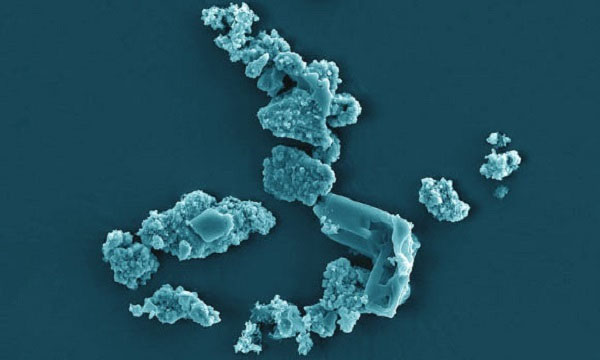Microorganisms like to eat meteorites
The metals in rock meteorites are the favorite food source of a microorganism named Metallosphaera sedula.

M. sedula eats seeds in asteroid.(Photo: Science Daily).
M. sedula draw energy from inorganic substances. The researchers found that M. sedula eats minerals in meteorites faster than they eat minerals on rocks on Earth. This finding provides valuable insights into the conditions that allow life to emerge and evolve in its infancy, as well as how microorganisms exist in outer space. The results of the study were published today 2 December in Scientific Reports.
M. sedula is heat resistant and low pH. Previous experiments have shown that it can live on Martian soil. The team from Vienne University decided to test M. sedula on a 120kg meteorite called NWA 1172 , found in northwestern Africa in 2000. This meteorite is rich in iron, the microorganism element that oxidizes to coral. Steamer, and other trace metals help promote metabolism and development. The researchers also fed M. sedula a sample of the mineral chalcopyrite on Earth, made of copper, iron and sulfur.
They found M. sedula cells digested the meteorite much faster than chalcopyrite. They live and thrive on rock meteorites by eating metal components, according to space biologist Tetyana Milojevic at Vienne University. The study also revealed that alien materials could provide food for some of the earliest life forms on Earth. Meteors can provide many essential compounds that support the evolution of life.
- Detecting a significant amount of microorganisms in the troposphere
- The surface of the 'giant' meteorite landed on Earth
- Concussion detection: Asteroids bring life to Earth 1.8 billion years ago
- Detecting microorganisms that live on ... 'arsenic' in the Pacific Ocean
- Find new clues about ancient life on Mars
- The origin and name of meteorite
- Argentina: A family hides up to 2.5 tons of meteorites
- Huge meteorites will graze the Earth
- Detecting algae-like fossils in meteorites
- Discover large meteorite in Antarctica
- Meteors appear in Canada
- Two meteorites fly close to the earth today
 'Fine laughs' - Scary and painful torture in ancient times
'Fine laughs' - Scary and painful torture in ancient times The sequence of numbers 142857 of the Egyptian pyramids is known as the strangest number in the world - Why?
The sequence of numbers 142857 of the Egyptian pyramids is known as the strangest number in the world - Why? History of the iron
History of the iron What is alum?
What is alum? International scientists discovered the mystery of Vietnamese bamboo attack
International scientists discovered the mystery of Vietnamese bamboo attack  Myth of the century: Eating more protein makes the muscles firmer, not fat
Myth of the century: Eating more protein makes the muscles firmer, not fat  The truth of beauty secrets that cause infertility to turn prostitutes into the most sublime queen
The truth of beauty secrets that cause infertility to turn prostitutes into the most sublime queen  The tunnel runs through 1,700 m high cliffs, dug by hand for 5 years
The tunnel runs through 1,700 m high cliffs, dug by hand for 5 years  Diet to train resilience, help hide and eliminate the body odor of Ninja
Diet to train resilience, help hide and eliminate the body odor of Ninja  Turns out this is the right way to eat fastfood that we haven't known for a long time
Turns out this is the right way to eat fastfood that we haven't known for a long time 